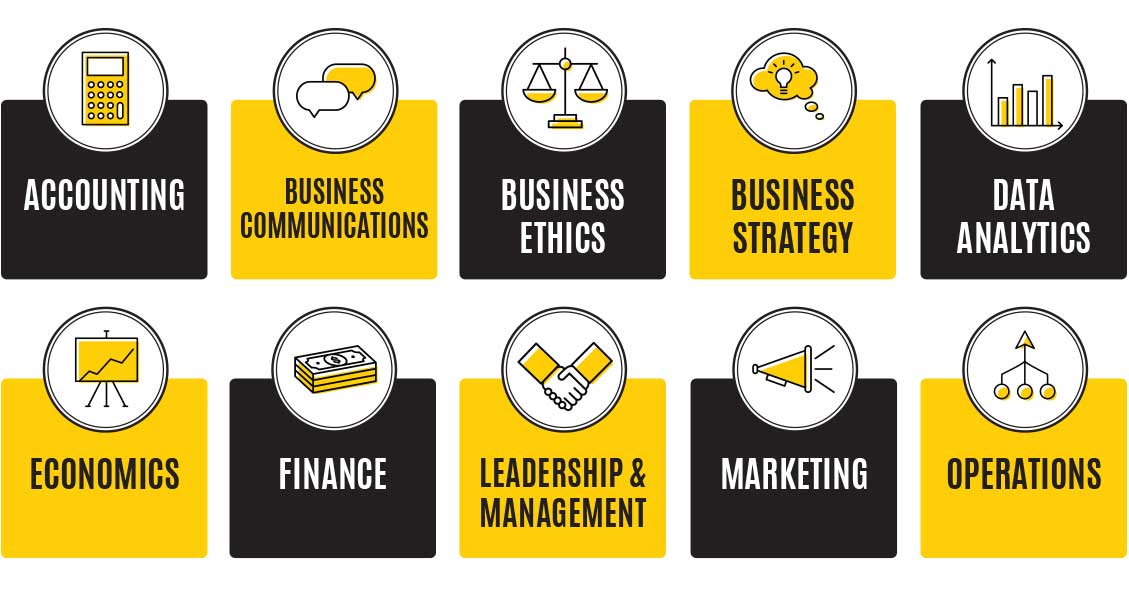
It’s all about the Benjaminsefits…the benefits of an MBA.
An MBA is more than a degree. It’s a sign, a billboard that says you have what it takes. It tells employers you have put in the time to learn the skills their organizations need—the knowledge that you can make key decisions, think strategically, and lead a team toward business success.
According to worldwide employment site Indeed.com,1 there are 11 reasons why an MBA is important for business.
Here are five of our favorites:
- An MBA can increase job prospects. Instead of big fish in a small pond, think big fish in a bigger pond. You’re graduating with the smarts and skills to do amazing things. When you graduate with your MBA, there’s a very good chance you’ll qualify for more and better roles.
- An MBA also allows you to venture down a new career path. Maybe you’re stuck in a career rut, or you can’t seem to break through that ceiling, glass or otherwise. An MBA can help you transition to a new career path regardless of your experience level or previous work history.
- Okay, maybe for you it is about the Benjamins. If so, an MBA can increase your earning potential. We will get more specific later, but MBA graduates typically enjoy higher salaries and can earn substantial signing bonuses.
- With all the talk of layoffs, downsizing, and budget tightening, an MBA can provide job security and help make your career future-proof. The knowledge, skills, and expertise you gain by getting an MBA can result in greater job security with your employer and within your industry.
- Last, we all want respect from our colleagues. An MBA helps garner that respect and improves your credibility. Yes, your experience and your work, day-in and day-out, sets you up for success, but an MBA and all that comes with it gives you added credibility as an expert in your field.
Let’s talk specifics. What skills does an MBA give you?
What are your goals in life and how is an MBA going to help? If you’re looking to build a career in business, an MBA gives you the skills recruiters are looking for, which are also the specific skills you need to set yourself up for success. According to MBA.com,2 the core curriculum of MBA courses typically includes:

Are there any hidden benefits to an MBA?
In addition to the specific classroom skills mentioned above and the traditional, expected benefits of an MBA, there are some surprising “emotional” benefits of an MBA. Elective courses and group projects help students work on leadership abilities and skills in a collaborative environment that fosters discussion.
According to the GMAT Club,3 graduates with an MBA can expect to leave with:
- Critical soft skills, including better habits and ways of thinking, increased influence, empathy, and confidence.
- Added value in their careers. An MBA can lead to increased credibility and marketable skills, which allow you to take more risks and really shine in your career.
- Broadened horizons. Your MBA education allows you time with classmates who have worked in many different fields. Plus, you get to “test run” your ideas through case studies and experiential learning. Time on campus is your opportunity to explore paths you may not even know exist – an opportunity that may not be available to you when you step into the “real world.”
An MBA degree can help you personally...
Think internal growth and the development of:
- Communication and networking skills. Your professional life often comes down to connections—who you know (and who they know). Networking skills you learn during your MBA can pay huge dividends down the road, helping you meet more people and build a referral base. That network of referrers can become future employers or clients that become integral to your career success.
- Leadership skills. Some people are born leaders. Others are made along the way. Your time online, on campus, and in the classroom is when leadership and entrepreneurial skills can be learned, nurtured, and refined through teaching, education, and collaboration. These are skills that will last a lifetime.
- Adaptability. How will you handle change? What will you do when something new comes your way? Studying for your MBA gives you valuable experience learning new subjects and techniques that you may not have received during your earlier education.
- Blue-sky thinking. You may not think of creativity when you hear “MBA,” but your graduate work often leans on strategic and creative thinking as a means of finding innovative business solutions in both your day-to-day work and during times of crisis. This kind of “big” thinking puts you in demand.
82 %
Skills, hidden benefits, personal growth... anything else? Oh yes, a salary.
The skills and benefits an MBA offers will have a profound effect on your future. But you also need to pay bills. You are probably asking, “What about pay? Will an MBA increase my salary?”
If you believe the numbers (and you should), yes it will.
Whether the increase is large or small, an MBA should give your salary a boost. According to the 2025 Coursera Salary Guide,4 MBA salaries get a boost of anywhere from 7% to 32%, depending on your industry. Not only that MBA graduates earn up to $50k more annually than those with a bachelor’s degree alone.
Let’s break it down by industry.


Iowa MBA graduates report an average salary increase of 34% post-graduation (around $17k), while over 57% get promoted.
$ 50k more
And the numbers get better (and bigger).
While there are no guarantees of financial success, a 2021 Forte Foundation study5 showed that the average salary for MBA graduates over time grew between 9% and 35%.
The average MBA salary after 5 years in the range of $142,469 (women) - $151, 951 (men), while the average MBA salary after 10 years reached $179,159 (women) - $241,607 (men) annually. Signs of steady career and financial growth that outpaces the economy.
Which MBA has the highest salary? According to bestcolleges.com,6 the “highest-paying MBA concentrations include consulting, finance, and technology. Choosing one of these concentrations can give you higher earning potential.”
So, is there a downside?
We have talked benefits, personal growth, and salary—the big three advantages of your degree.
Are there disadvantages of an MBA? There can be.
The first and most obvious is the financial obligation. An MBA is not free and you may have to pay down a substantial debt.
According to the Education Data Initiative,7 a Master’s Degree in Business Administration may be the most popular graduate degree available. But because of this popularity, securing financial aid can be a highly competitive process. Partial- and full-tuition scholarships exist for MBA degrees; frequently these are set aside for disadvantaged communities or those with military service.
- The average cost of a Master’s Degree in Business Administration is $60,410.
- The average cost of an MBA degree from 1999 to 2020 was $49,440.
Another perceived downside is that your career goals may not match up to the benefits an MBA can offer. According to MasterClass,8 “Real-world experience can sometimes be more valuable, especially for entrepreneurs, than learning the ins and outs of management.” It’s critical to make sure your MBA program actually fits your career ambitions.
In the long run, does getting an MBA pay off?
According to the Graduate Management Admission Council,9 yes. In a recent survey, they reference that the median starting salary for a recent MBA graduate can reach $120,000. That’s nearly double the average MBA cost of $60,410.7 Depending on where you earn your MBA and where you work, the degree could show ROI within a year of graduation.
$ 60,410
$ 120,000
Do I really need an MBA?
You're considering an MBA. You're weighing the options, the pros, the cons, and the potential pay. But there’s that little voice in your head, asking, “Is an MBA really necessary?” Does MBA school really matter?
According to MBAMission.com,10 “The easy answer is yes—go for it. Chances are high that you will make more money, have a better knowledge base that can propel your career forward, and make connections that will position you for future success. But an MBA is not for everyone, and especially not for anyone who is unsure what is driving them to pursue the degree. Before you dive in, think about why you want an MBA and where you want it to lead you.”
Remember, while all MBA degrees are not created equal, your MBA studies can help you develop broad business knowledge.
As noted earlier, the typical curriculum covers corporate finance, strategy, marketing, organizational behavior, and accounting. If you’re planning to work in a business-related field, in management, or want to start your own business, an MBA may be worth the expense, time, and effort.
Are people happy with an MBA? Here's what your peers are saying.
Only you know if an MBA should be the next step in your education and your career, but speaking with past graduates can go a long way toward informing your decision. If you haven't talked to MBA grads, you should. We did, and this is what a few of them had to say:

“I was initially drawn to the Tippie College of Business because of its ranking, and I knew pursuing my MBA there would help progress my career.”

“I had a great experience overall. I went back to school to learn skills that would help me find a new job after years out of the workforce. I accomplished that and so much more.”

“I got everything I expected to get out the MBA program and more. In addition to what I learned in the classroom, I learned to be ruthless with my time management.”

“The Iowa MBA helped me feel like I can be a part of the conversation no matter what level it’s at.”

“I use my MBA every single day of my life.”

“My MBA opened my mind to thinking about the big picture of business.”
Additionally, in information provided by Poets & Quants,12 “Some 88% of respondents said they ‘strongly agree’ or ‘tend to agree’ that they ‘gained substantially more skills’ to help them do better in business. Interestingly, another 82% either strongly agreed or tended to agree that the MBA helped them become more mentally resilient.”
In the same study, nearly three-quarters noted that they had been able to develop the business skills they wanted, while 72% said their MBAs made them more confident working abroad. And 65% agreed that their MBA helped them improve their professional network, while 64% said that an MBA helped them feel that they had what they needed to reach their goal salary.
Are you ready to take the next step in your education and in your career? Or, do you still have questions that need answers? If you’re still asking, “Why should I get an MBA?” read more here.
Interested in learning more about Iowa’s top-ranked, part-time MBA?
Related articles
Still have questions?
Q: What career opportunities can an MBA open up for me?
A: An MBA can significantly enhance your career prospects. It can lead to opportunities in various fields, such as:
- Management Consulting
- Financial Services
- Marketing and Sales Management
- Entrepreneurship
- Operations Management
- Human Resources
With an MBA, you may also qualify for higher-level positions and leadership roles.

Tippie’s Amy Bartachek weighs in on popular career choices for MBA graduates.
Q: How does an MBA affect salary potential?
A: An MBA can lead to a substantial increase in earning potential. On average, MBA graduates earn:
- 20-30% more than their counterparts with only a bachelor’s degree
- Higher starting salaries, often exceeding $70,000
- Increased opportunities for bonuses and profit-sharing
- The return on investment can be significant over time.
Q: What skills do I gain from pursuing an MBA?
A: An MBA program equips you with a diverse skill set that is valuable in the business world, including:
- Leadership and team management
- Strategic thinking and problem-solving
- Financial analysis and budgeting
- Marketing and brand management
- Negotiation and communication skills
Q: How can I choose the right MBA program for my goals?
A: Selecting the right MBA program requires careful consideration of your career goals. Here are key factors to evaluate:
- Program accreditation and reputation
- Specializations offered that align with your interests
- Networking opportunities and alumni success
- Flexibility of the program (full-time vs. part-time, in-person vs online)
To make an informed decision, attend a recruiting event, visit campus, or meet online with an enrollment specialist.
Q: What is the typical duration of an MBA program?A: The duration of an MBA program can vary based on the format:
- Full-time programs typically last 1-2 years
- Part-time programs can take 2-4 years
- Online programs often offer flexible timelines. Programs like the Iowa MBA set up their curriculum for maximum flexibility and optimized learning.
Consider your current work and personal commitments when selecting a program.
Q: Are there any financial aid options available for MBA students?
A: Yes, there are various financial aid options for MBA students, including:
- Federal student loans
- Scholarships based on merit or need
- Assistantships and fellowships
- Employer tuition assistance programs (Check out our Employer’s Guide to the Iowa MBA for more info.)
Research and apply early for the most opportunities.
Q: What is the importance of networking during an MBA program?
A: Networking is a crucial aspect of an MBA program that can lead to career advancement. Benefits include:
- Building professional relationships with peers and alumni
- Accessing mentorship opportunities
- Gaining insights from industry leaders
- Finding job opportunities through connections
- Engage actively in networking and alumni events to maximize these benefits.
Q: How can I leverage my MBA degree in entrepreneurship?
A: An MBA provides valuable skills and knowledge for aspiring entrepreneurs. To leverage your degree effectively:
- Utilize your network for support and mentorship
- Apply financial and marketing principles to your business
- Access resources from your school’s entrepreneurial center
- Participate in business plan competitions for exposure
These strategies can increase your chances of success in business ventures.
Sources
- Trevon Bennet. “Why Get an MBA Degree? 11 Career Benefits to Know About.” Indeed.com, July 30, 2024.
- Bethany Garner. “What Do You Learn In An MBA Program.” MBA.com, April 2022.
- Karie McQuarrie. “3 Unexpected Benefits of MBA Beyond Job, Skills, and Career.” GMAT Club, February 2023.
- “MBA Degree Salary: 2025 Guide.” Coursera, January 6, 2025.
- Dr. Michelle Wieser. “Experiences and Outcomes of the MBA by Gender and Race.” Forte Foundation Study, September 2021.
- Genevieve Carlton, Ph.D. “Which MBA concentration pays the most?" BestColleges.com, August 29, 2023.
- Melanie Hanson. “Average Cost of a Master’s Degree.” Education Data Initiative, November 2024.
- “What Is An MBA? The Pros and Cons of Business School.” MasterClass, August 2021.
- Graduate Management Admission Council. “Corporate Recruiters Survey – 2025 Summary Report” 2025.
- Rachel Beck. “Is an MBA Worth the Investment in 2024?” MBAMission.com, February 2024.
- Nathan Allen. “Two-Thirds Of Global MBAs Say They Are Satisfied With Their Degree.” Poets & Quants, September 2020.

